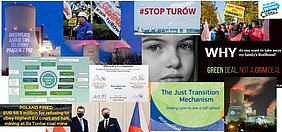Wydarzenia
Naszą intencją jest uczynienie z zespołu uniwersytetów w Halle, Jenie i Lipsku centrum badań polonoznawczych, widocznego na arenie międzynarodowej. Cel ten mamy zamiar osiągnąć nie tylko za sprawą międzydyscyplinarnych imprez naukowych, ale także za pośrednictwem dyskusji specjalistycznych. Część naszych działań skierowana jest poza tym do zainteresowanej publiczności, którą chcielibyśmy zapoznać z polską historią i kulturą, polskim językiem i społeczeństwem.
Do wydarzeń naukowych należą regularne zebrania naukowe, konferencje, warsztaty i cykle wykładów, w dalszej perspektywie planowana jest także szkoła letnia. Studentom oferujemy oprócz zblokowanych seminariów, będących integralną częścią studiów na kierunku Międzywydziałowych Studiów Polonoznawczych, także wycieczki naukowe do Polski.
Do szerszej publiczności skierowany jest cykl pokazów filmowych organizowany przy współpracy z Instytutem Polskim w Lipsku, Kolegium im. Imre Kertésza w Jenie, Puschkino w Halle, Deutsch-polnische Gesellschaft Sachsen-Anhalt i Landeszentrale für politische Bildung Sachsen-Anhalt. Filmy pokazywane w ramach tych cyklów oraz przyszłe spotkania z polskimi autorami są tematycznie powiązane z dziedzinami badań Centrum.
Cykl wykładów

Collage: (c) Martina Berrocal/Nadine Thielemann
Martina Berrocal (Jena)/Nadine Thielemann (Wien): From Green Deal to grim deal – Public campaigning between corporate spin and nationalism in Poland
26/1/2023, 15:00 (s.t.), in presence at FSU Jena, Carl-Zeiss-Straße 3, SR 385, 07743 Jena
Climate policies, such as the EU’s Green Deal, pose serious challenges to the operations of energy companies, especially those that are strongly dependent on fossil fuels. This lecture is based on a joint study that explores the case of a Polish energy company PGE that operates a lignite mine in the Czech-Polish borderlands. Methodologically, the study is based on a combination of content and frame analysis.
In a public affairs campaign, PGE aimed to challenge the constraints imposed by the EU Green Deal and a CURIA (Court of justice of the EU) order to cease mining operations. In a skilfully designed corporate propaganda, PGE re-frames the Green Deal and delegitimizes the European institution so that the message ties in with anti-EU sentiments and thus establishes a viable connection to the conservative Polish public and the Eurosceptic right-wing politicians.
Wykłady

Collage: (c) Martina Berrocal/Nadine Thielemann
Martina Berrocal (Jena)/Nadine Thielemann (Wien): From Green Deal to grim deal – Public campaigning between corporate spin and nationalism in Poland
26/1/2023, 15:00 (s.t.), in presence at FSU Jena, Carl-Zeiss-Straße 3, SR 385, 07743 Jena
Climate policies, such as the EU’s Green Deal, pose serious challenges to the operations of energy companies, especially those that are strongly dependent on fossil fuels. This lecture is based on a joint study that explores the case of a Polish energy company PGE that operates a lignite mine in the Czech-Polish borderlands. Methodologically, the study is based on a combination of content and frame analysis.
In a public affairs campaign, PGE aimed to challenge the constraints imposed by the EU Green Deal and a CURIA (Court of justice of the EU) order to cease mining operations. In a skilfully designed corporate propaganda, PGE re-frames the Green Deal and delegitimizes the European institution so that the message ties in with anti-EU sentiments and thus establishes a viable connection to the conservative Polish public and the Eurosceptic right-wing politicians.
Studia Interdyscyplinarne Polonoznawcze

Collage: (c) Martina Berrocal/Nadine Thielemann
Martina Berrocal (Jena)/Nadine Thielemann (Wien): From Green Deal to grim deal – Public campaigning between corporate spin and nationalism in Poland
26/1/2023, 15:00 (s.t.), in presence at FSU Jena, Carl-Zeiss-Straße 3, SR 385, 07743 Jena
Climate policies, such as the EU’s Green Deal, pose serious challenges to the operations of energy companies, especially those that are strongly dependent on fossil fuels. This lecture is based on a joint study that explores the case of a Polish energy company PGE that operates a lignite mine in the Czech-Polish borderlands. Methodologically, the study is based on a combination of content and frame analysis.
In a public affairs campaign, PGE aimed to challenge the constraints imposed by the EU Green Deal and a CURIA (Court of justice of the EU) order to cease mining operations. In a skilfully designed corporate propaganda, PGE re-frames the Green Deal and delegitimizes the European institution so that the message ties in with anti-EU sentiments and thus establishes a viable connection to the conservative Polish public and the Eurosceptic right-wing politicians.
Odczyty i pokazy filmowe

Collage: (c) Martina Berrocal/Nadine Thielemann
Martina Berrocal (Jena)/Nadine Thielemann (Wien): From Green Deal to grim deal – Public campaigning between corporate spin and nationalism in Poland
26/1/2023, 15:00 (s.t.), in presence at FSU Jena, Carl-Zeiss-Straße 3, SR 385, 07743 Jena
Climate policies, such as the EU’s Green Deal, pose serious challenges to the operations of energy companies, especially those that are strongly dependent on fossil fuels. This lecture is based on a joint study that explores the case of a Polish energy company PGE that operates a lignite mine in the Czech-Polish borderlands. Methodologically, the study is based on a combination of content and frame analysis.
In a public affairs campaign, PGE aimed to challenge the constraints imposed by the EU Green Deal and a CURIA (Court of justice of the EU) order to cease mining operations. In a skilfully designed corporate propaganda, PGE re-frames the Green Deal and delegitimizes the European institution so that the message ties in with anti-EU sentiments and thus establishes a viable connection to the conservative Polish public and the Eurosceptic right-wing politicians.